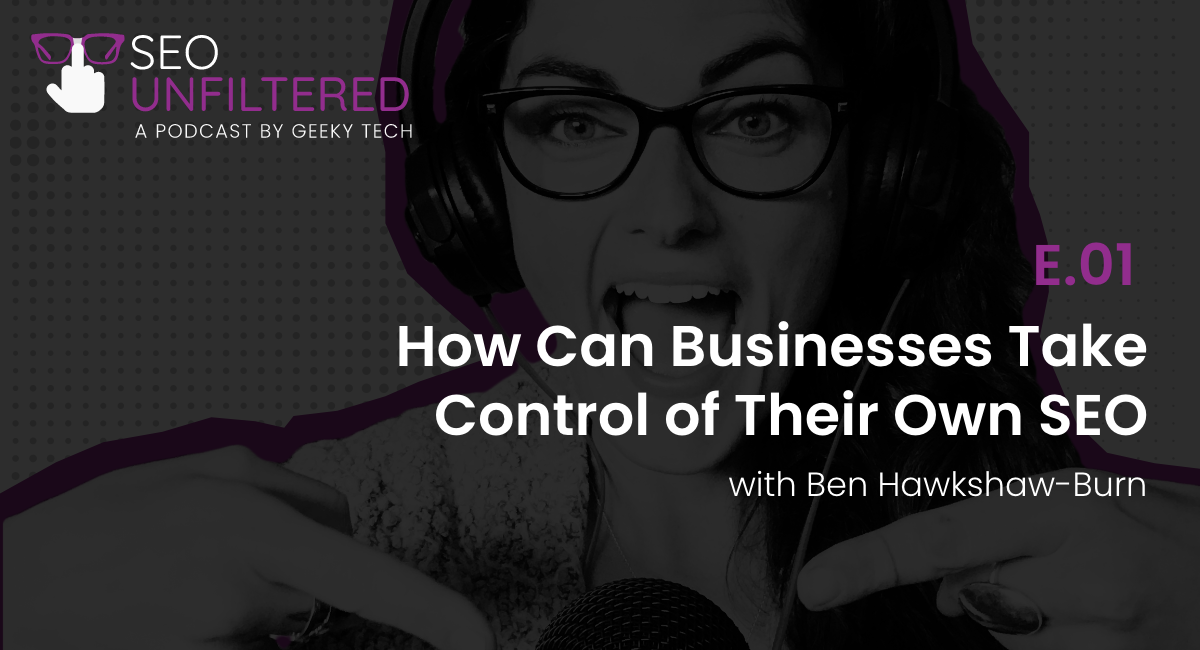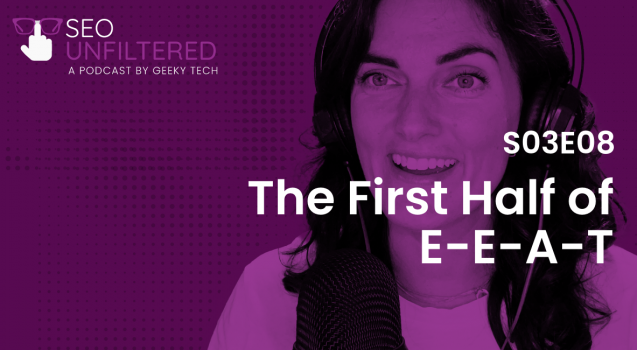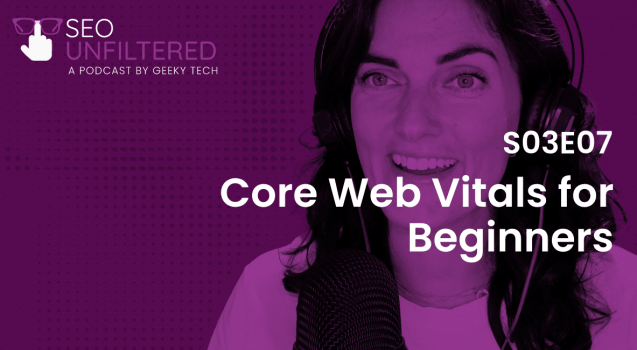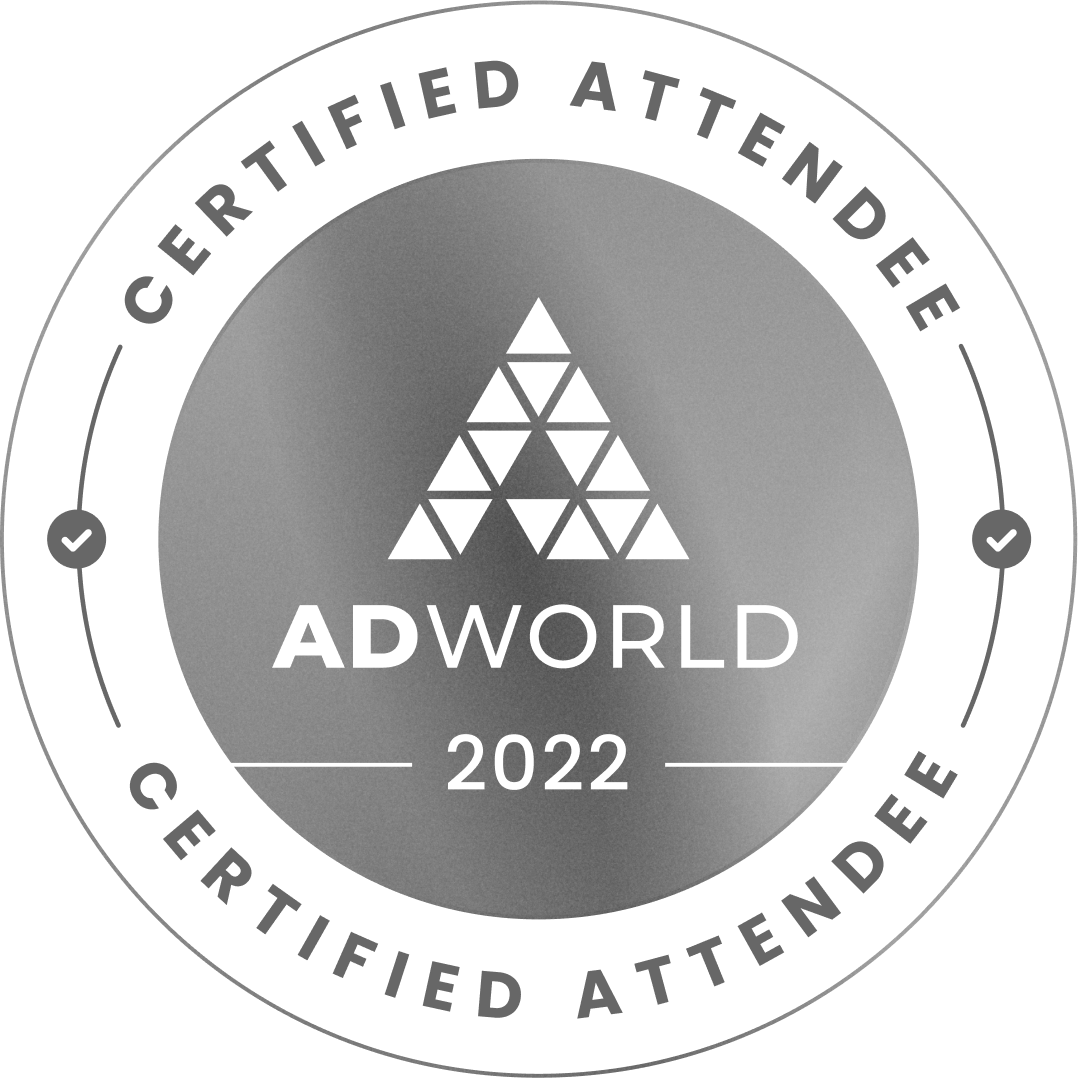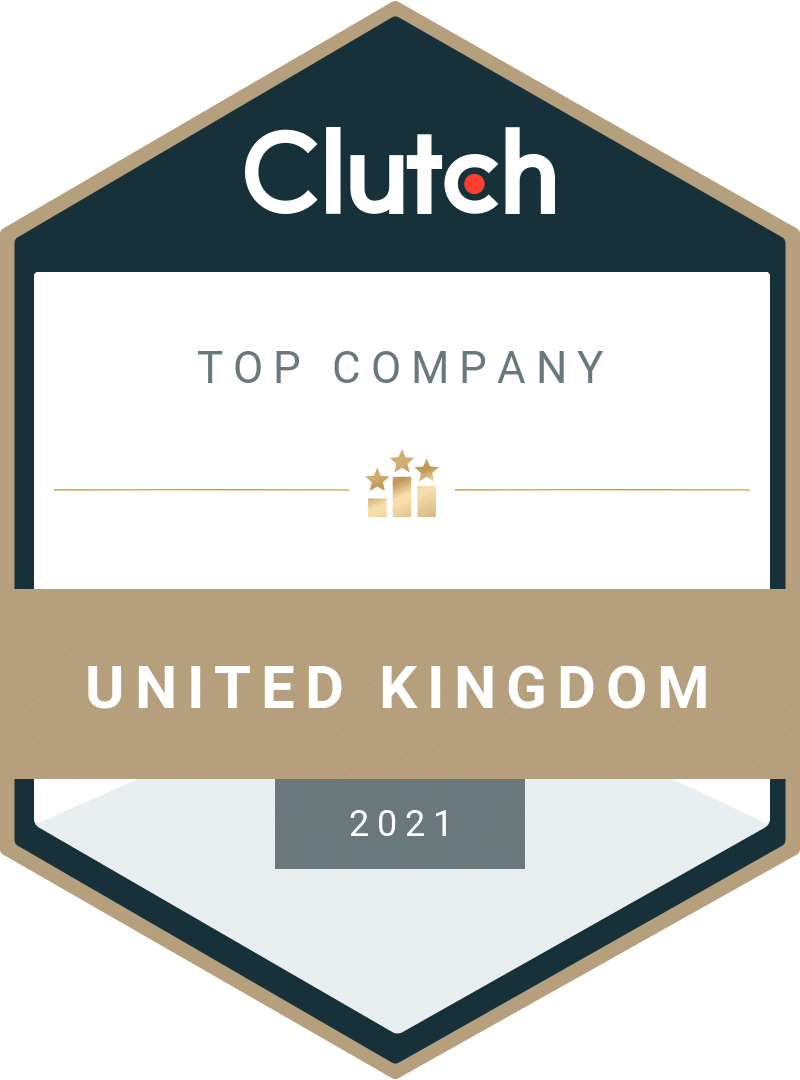Transcript
Genny: [00:00:00] What’s up geeks. Welcome to season one episode, one of SEO unfiltered. Today, we’re going to be talking about how businesses can take control of their own SEO. As you probably know, SEO is a powerful, digital marketing technique with the sole purpose of increasing your sites, visibility and search result rankings.
But before we get into that, I think it’s important to discuss why businesses should even bother doing their own SEO in the first place. I mean, there are a good Gillian marketing agencies out there who would be more than happy to do the work for you. So who better to answer that question than a person whose livelihood very much depends on companies hiring external SEO agencies.
I’m joined today in this very first episode by one of the co-founders of geeky tech, a UK based digital marketing agency and the guy who writes my paychecks, then Hawk shopper.
Ben: I’m very good. Thank you. How are you?
Genny: I’m good. Thanks. So Ben, what I want to ask you is, is it actually worth it for marketing [00:01:00] teams to learn how to do their own SEO when they can just hire a company to do it for them?
Ben: That’s a really good question. And I think the answer is yes. Um, it is really important for them to understand, even if you are going to outsource it to somebody else, you still need to understand what it is that you’re buying to be, to be able to do a good job of buying it into, I guess, Quantify the results that the, the agency have got you, but the best way to look at it or a framework I suppose, is to first understand that SEO isn’t actually, um, its own thing.
It’s just the signals that Google’s algorithm use to determine where a website should rank. So, you know, people, the way people talk about SEO and think about SEO as if it’s something that they should be doing or buying or receiving. You know independently, um, but it’s just the real world signals. You know, the words that you put on your website, how Google looks at your website and who else talks about you on the internet that go towards [00:02:00] where you fall in Google.
And if you understand that it actually empowers you as a marketer.
Genny: Okay. Good point. Um, can you possibly share your experience of working or hiring an SEO company and not actually knowing. Too much about SEO and what, how that affected your website.
Ben: Yeah, so that definitely from the, we have some first firsthand experience with, um, so before we were geeky tech, when we first got together, we’ve kind of formed a full service digital marketing agency.
So we were, um, we were predominantly doing. Uh, but we were building websites within email marketing, text message, marketing, telemarketing, predominantly outbound lead generation. And we were asked by one of our customers, if we could, uh, if we could do some SEO and we were keen to kind of service that customer, we would we’d work that out and, and help them out.
And we, um, we found a guy [00:03:00] that said he could do some SEO and again, at the time, not fully understanding. I mean, we understood the concept that. You know, some, some stuff was going to happen that would, you know, get our website to the, to the top of page one. And then in turn, you know, you would generate leads, which when everything you’re doing is outbound.
That, that sounds like the kind of holy grail. Um, and yeah, we, we outsourced it. We outsourced it to this guy. Um, initially actually worked incredibly well. So, um, we, uh, we did some ourselves, we got this guy to do it for other customers. Um, but then sadly. Google rolled out their first, what the called penguin and Panda algorithm updates.
And, um, very long story short, Google just changed the rules on, you know, how they judge websites. And it turned out that the guy that we’d outsource to, um, he’d actually outsourced again. Um, and the company hit outsource to had built. All of these links. I mean, we didn’t really know he was even building links at the [00:04:00] time, but they’d built all of these links on psychic websites and all these really kind of like mystic, meg.com.
And, you know, we had these comments and, you know, the whole thing just looked unnatural. He didn’t need to be. You know, rocket scientists, but we, again, we weren’t told that at the time and it wasn’t until it started to go wrong that, you know, and that was what started the whole geeky tech journey is trying to work out like, what has this guy done?
What’s happened to the results, you know, what is SEO and. Yeah. In that time, we realized that most, you know, a lot of people say they, they know SEO, they do SEO, but it’s, it’s actually, it’s very few and far between the people that truly kind of understand it in, uh, you know, generating results
Genny: you’re saying is that it was almost out of necessity that you became SEO experts.
Ben: It was, yeah, I mean, I suppose necessity. And also because we had been shown how good it could be. So [00:05:00] we were quite, we were quite sold on it. So because the, the techniques that this guy was using were essentially known as black hat techniques, that he was paying people to build these really spammy.
External links, which at the time when he was doing it, move the needle incredibly, you know, Google responded really well to them. Um, and we got great results. So when you’ve never had a customer come to you and now you have people inquiring with you directly and you’re not chasing them, it. It makes you want to invest that time into, you know, it was made, it made it even more painful when we started to lose those results because we kind of almost tasted this amazing, uh, you know, thing.
Um, and that was enough. I think if we hadn’t have seen some results first, we probably wouldn’t have been committed to go so far down the rabbit hole.
Genny: Okay. Okay. So moral of the story is that knowing SEO will prevent you from getting taken for a ride by these so-called SEO companies that don’t really [00:06:00] do much.
Ben: Yeah. And it will also help you. I mean, this is something that I kind of say to our customers is that, um, in the long term, you, you will actually do more. If you’re the marketer for the business, you will do more SEO than. You know, for you over the long-term, we will help you understand the signals that Google is using and understand some of the principles and we can be paid to generate some of those external signals.
Um, but once you understand it as a marketer, you know, you’re, you’re actually then empowered to, to have some impact on your own site’s SEO. Okay.
Genny: Well, that’s good. So on that note, let’s pretend I’m a marketer and because I’m talking to a geeky. Um, expert here, a tech marketer, and I’ve just decided to take a stab at SEO.
What is basically the first thing I need to do?
Ben: So, I suppose the first thing is once you’ve kind of understood or you’ve got your head round, the fact that SEO isn’t its own [00:07:00] thing, it’s not something that you you’re going to go and buy. I mean, you can pay people to do it and you can pay for services, et cetera, but you, you really need to start to understand.
What is SEO and everything from kind of ground zero comes down to the keyword. So the first, the first part of SEO is to actually understand who your customer, hopefully, you know, who your customer is. So hopefully your business already has identified, you know, some target markets or some personas. Um, so you can clearly articulate.
You know, this is who we want to target. And, and also you can hopefully articulate what you do and the problems that you have, and it’s basically then working out. What is that perfect person that ideal persona, what words and terms and phrases are they using to search Google? Um, and again, it, from an SEO perspective, these are often called keywords.
So that the first step one is to work out well, what do I actually want to show for in Google? What word would someone search? Okay.
Genny: [00:08:00] So how do I, how do I get the keywords? I have to use a certain software or what do I do?
Ben: So there are loads of tools out there that can help with keyword research, which is the kind of process of working out the keywords that you want to rank for.
But, um, to take a more basic approach, you, it really makes sense to start with common sense. So to think about, you know, what, what is it that your audience are typing? And you can actually just go to Google. You don’t have to pay for a tool. You can just go to Google and search the word. And, you know, judging the result should give you an indication whether you’re along the right track or not.
So, um, if you type a word in and the results and not your competitors, it’s not the same solution that you offer. If it’s, you know, loads of really kind of unusual websites, you’re probably, you’ve got the wrong term. Obviously there’s loads of other ways that you, in an ideal world, if you’re doing it professionally, you want to quantify that.
That word has searches. So every month you can see people are [00:09:00] searching for that term. Um, and you also really want to be able to quantify the level of competition. If you go to Google and search a word and you can see, you know, Wikipedia is number one, followed by the BBC, and then the times, you know, those are all massive powerhouse, web.
Uh, you know, what are the chances of you actually showing in those results? That’s really important because you want to, you want to pick a race that you can win. Um, you know, or at least you can do really well. Um,
Genny: well, how would you go about doing that? So few just gave the example of if you want to rank for a certain keyword, but then you type it into Google and it’s like Wikipedia and.
I can’t think of any other popular website, but all of these major websites that are showing up on page one, and there’s probably no way you can outrank them. So then what are you doing?
Ben: You need to find an alternative really? Um, it, I suppose you need to make a decision as to if it’s a race that you want to get it.
If it’s the only term, uh, you know, it’s really [00:10:00] competitive, that might be your niche. And you, you need to just start that back and be aware that it’s going to take you a long time, um, or you want to get into some different races. Um, so. You know, terrible example, but let’s say that you wanted to rank for red widgets.
If you work out that, you know, your website or your business or service, you know, creates red widgets, and you can see people are searching for red widgets, but actually there’s loads of big competitors there. And you, you don’t think that your site, and again, it’s, you need to understand some of these signals to be able to quantify this, but you can.
Probably tell just again, using common sense and the size of a business. If the business is 10 or 20 or 30 times or a hundred times bigger than you, you might struggle to compete in Google. Um, and then you want to find a different word. So, you know, a specific type of red widgets, you know, like, uh, Which is less red widget
go use red widget, [00:11:00] exactly. Or, you know, disposable red widget or something like that. You, you want to find something where there’s less competition. And again, a good thing to remember is that you’re not really. In competition with, you know, everybody else in, in Google, it’s just, or, and you’re not really in competition with Google.
Google will always show 10 websites on page one for any search result. It’s just the signals that Google use to determine who is the best for them to show who’s the most relevant. And when you understand those signals and the words that people are using, you can make them. Adequate changes on your website to incorporate those words for Google, to at least include you in those races.
Genny: Okay. Okay. That makes sense. So I’ve got my list of keywords. Um, I figured out possibly which ones could actually rank. Um, is there anything else I need to know about my keywords or need to know about keyword, um, research or strategy? [00:12:00]
Ben: I suppose probably quantifying that this search volume is the most important thing.
Um, checking that there’s realistic levels of competition. So even if may be can’t make position one, can you make it into the top two or three results? Cause that’s where all of the traffic is. Um, and I suppose from there, if you’re going it alone, they are the. The best things that you can, you can, can do.
The other thing you can do is you can look at some third-party tools, there’s tools like SEMrush there’s tools, like H refs or Moz majestic. Um, the tool I really like is a tool called key search.ca. Um, that is a really low cost tool. You can probably get that for 15 or 20 quid or something a month. And you can, you can use that too.
It really, all it’s doing is extracting data. That’s already come from Google, but it will also include some of the Google AdWords planner data. So if you, and you can access this data by creating a [00:13:00] free Google ad words account, but within Google ad words. So rather than organic traffic SEO, if you are going to pay Google to.
To buy traffic. Google will give you examples of words that are similar to your word. They will also tell you how many people are searching that word. And they would also tell you the approximate cost per click for that word. So if somebody’s one word, you know, red widgets might. Five pound per click and blue widgets might be 10 pound per click.
And if you can, you can see that people are spending twice as much on blue widgets, which gives you some data as to, okay. Potentially there’s more of a transactional value behind blue widgets over red widgets, as an example.
Genny: Okay. Wow. That was a lot of helpful information. And I think what I’m going to do is link all of those suggestions in the show notes so that marketers can just quickly take a look and see if they can maybe start a free trial or just practice or look around.
We have the list of keywords we’ve [00:14:00] researched the competitors. We’ve looked at the, um, did you call a viability of the keywords or. Um,
Ben: yeah, I guess so whether it’s done in a ratio, you can win.
Genny: So now I’m a marketer. I’ve got my keywords. I’m feeling confident. Is there anything else I need to do? What’s next?
Ben: So the next thing is to actually put those words onto your website. So once you’ve kind of covered off the strategy or keyword research, the second area of SEO is, is often referred to on-page optimization. On site optimization. Okay. And again, that can get quite geeky and quite technical where there is some, um, there’s some technical, uh, housekeeping, I suppose, that you, some, some, some areas that you want.
And again, we could also link to this in the show notes. There’s some areas from an on-page perspective where you just need to have. I suppose good housekeeping from Google’s perspective. So you want to make sure that your site is crawlable is [00:15:00] indexable. There’s some kind of basic stuff, making sure that, you know, your site is in good health for Google to be able to access it once you’ve, you’ve nailed some of those fundamentals.
You need to make sure that you take that key word and you create a page on your website about that term. It’s essentially. All answers, the search has query. Um, and that’s, that’s the way that you need to be thinking about SEO as well. So somebody goes to Google and they search for, uh, you know, a disposable red widget.
You need to service that query with a page that shows Google clearly that you guys see. Disposable red widgets. You know, you need to talk about disposable red widgets. You need to, you know, maybe show pricing, show images, whatever it would be that would be relevant to that search term. Um, and if that was an informational style query, so if somebody searched for like, what’s the best.
Widget to use then, you know, rather than have a really clearly obvious sales page, you need to have a page, which is, you know, cause [00:16:00] some kind of like reg widget comparison, you know, red widgets versus blue widgets and how to make the best decision or, you know, what should I be thinking about when buying widgets, et cetera?
Versus somebody that, um, you know, is looking for a specific type of widget where you may be then want to sell them that product. And some features on that specific product. All of those words need to be included in the right part of the site or the right part of
Genny: the page. Okay. That was going to be my next question.
When you say the right part, what do you mean? Cause I’m just picturing slopping it anywhere on the page.
Ben: So, yeah, and it will, it does need to be on the page, but what we’ve been, what we’ve been able to do with our kind of SEO testing, uh, is we’ve been able to make some, because Google doesn’t really want to give this information away.
Google doesn’t tell you exactly where part of the site they’re looking at, because they don’t really want you to be able to gain this. They want you to just naturally build a good site and then. Cruel that site and make a judgment without you kind of obviously manipulating it. Um, but the, [00:17:00] we, you know, we do have a best practices, which is available somewhere on the website, which is definitely worth, um, linking to that because people can see our kind of roadmap for success.
The main, um, place that Google’s going to be looking is the URL. So they’re going to be looking at the keyword in the URL. So if your page is forward slash. You know, um, disposable red widgets. That’s a really strong indicator to Google that this page is about disposable red widgets. Versus if your page is just forward slash post nine WordPress or Y whatever you want to take some control of that URL, maintenance, slug.
Nice read the key word. And then when it comes to the page itself, you’ve got. The, um, Metta tie two and the H one tag. Now the meta title is the title that you see before you click through. So when you search and the results, you see a title followed by a meta description, you know, the small description before you click through that wants to include your keyword.
Not [00:18:00] necessarily the meta-description, but. Meta title and the meta title then wants to match the H one tag on your website. So the H one tag is like the OnPage title. The meta title is like the off page title. And if they’re all consistent alongside the URL that I would say is the three strongest signals to Google.
What, what is this page? So
Genny: if I, I mean, let’s just say I’m extremely good I’m marketing, but I don’t really know that much about how to go into the backend of a website and fix these things. Is there a barrier to entry or what can I do to maybe skill up or should I just say screw and ask someone else to do it because a.
Ben: Um, like with everything there’s, there’s definitely different levels. If you are, if you have a WordPress website and you have a basic knowledge of WordPress, you can definitely do, you know, 10, 20, 30% of the work that’s required to at least get you in the race yourself quite easily. Um, [00:19:00] and again, you know, available on our site are.
This is, if you, every time you created a piece of content, you followed those best practices. That’s definitely going to give you a head start, um, like with everything, there’s always another level of geekiness. So, you know, there’s, there’s schema markup, which is like structured code that can be added to your site to tell Google about your address and your telephone number and your social accounts.
You can complete, you can write a custom schema markup for individual products. So to put schema around the price of your widgets or the size of your widgets, and that is basically code or data in Google’s language. Um, so you know, that kind of optimization gets a bit tricky. There are tools out there.
Okay. The old, like write some schema for you, which is better than having no schema. Um, but again, uh, there’s kind of always another level of geekiness, but I think you can do the basics yourself
Genny: for sure. And I know you mentioned the best [00:20:00] practices guide, which we will also be linking in the show notes.
So that is very helpful. Thank you. My next question is, do I have to start from scratch or can I use the, um, the pages already have.
Ben: You don’t have to start from scratch again, where you do have to start from is what word do you want to rank for? And so if you go on that journey and you work out that you want to rank for disposable red widgets, and then you look at your site and you’re like, okay, we don’t actually have a disposable red widget page.
You don’t need. You know, scrap everything else on your website, but you are going to need to add a disposable red widget page. It’s going to be very tricky for Google to show you without having a piece of content about that topic. If you’ve already got a red widget or a disposable red widget page, then you could look at tweaking it to include the word.
You know, when I see a lot of people do is when they build a website or they create a, uh, a [00:21:00] piece of blog content. Now they’ll create a really catchy marketing title. So it will be very like, you know, blue sky thinking. World-changing like marketing fluff. But they won’t actually do a very good job of technically describing what the page is about.
So this page is selling red widgets or it’s disposable red widgets listing all of the possibilities, the features of like, you know, the world’s biggest smartest, you know, strongest, most durable, disposable widget, you know, unless you use the words, disposable red widget, it’s going to be really tricky for Google to actually understand that.
And those changes can be. Made in, some of them were obvious places on your own within WordPress, or maybe even using plugins like SEO, Yoast. And again, that, that is really SEO. Yost is only as good as the keyword you put in it. So if you work out that right word and you say, okay, disposable red widgets, and you put that into SEO, [00:22:00] that will tell you the main places that you need.
You need to put the word.
Genny: Okay. You were seeing that when it comes to keywords, it’s that a lot of it is actually quite intuitive and just takes common sense. Is that the same thing for on-page SEO?
Ben: Sadly, not so much. No. Um, the keyboard stuff is definitely a bit more intuitive because it is just more common sense.
Like w what is my, my target searching for, you know, is that relevant? Is, you know, is it transactional? Can we make money and sell off the back of that? Um, knowing where to put that word on the site is, is definitely one of the things we’ve spent. I would say the most time. Researching and proving because Google doesn’t share that information.
They do give some information away. They’ll tell you, this is, this is that they do have their own best practices. Um, but yeah, having, having the basic knowledge is, is definitely achievable for anybody. Anybody that can use WordPress, [00:23:00] you can, you can include a H one tag and a meta title, and you can do some other obvious things.
Like when you add an image to your. Your website, rather than the name of the image being called shutter stock six, nine, eight, you can call it, you know, a picture of a disposable red widget. And that is also going to help Google understand that. Okay. This page is about disposable red widgets with pictures of dispose of red widgets.
Genny: Can you maybe quickly tell us the difference between user experience and technical accuracy? We’re under the context of on-page optimization.
Ben: Yeah, that’s a really good question actually. Cause a lot of people get, get kind of confused. I think there’s a lot of misinformation on the internet about that.
So, um, user experience is obviously very important from a conversion perspective. So how somebody interacts with your website, you know, it needs to work basically. Go to the [00:24:00] effort of sending some traffic to your site, you definitely want it to convert, but the user experience is less of a ranking factor from like an SEO perspective, um, from all of the tests that we’ve done.
The only thing we’ve really been able to identify as a ranking factor is the time to first it. So how long. It takes for the server to respond before page kind of begins to load. So I think if you have a terrible page experience, if it takes like three minutes for the page to load and people leave, that will definitely have a negative impact on, on your SEO.
But. Typically the user experience is more about you actually converting somebody once they’ve got their, Google’s not really looking at the user experience as part of its ranking algorithms. It does look at how people interact with a page. And if people interact with a page poorly, That’s going to act as a weaker signal to Google, but it’s probably not as important as most people think.
Even if your site is a bit slow loading, as long as it’s not slow [00:25:00] enough to put a person off waiting, it’s not going to have a negative impact on the search results.
Genny: Okay. I didn’t know that. But what about content? How do I make sure my webpages are optimized? I know you’ve talked about, um, keywords and everything like that, but what else should I be doing?
What do I need to look for?
Ben: Well, you need to keep making sure that you produce content around different topics that you, you want to be ranking for. The, again, the big thing that we see is people often will cannibalize some of the pages. So if you create a blog post on disposable red widget, And then you keep creating lots of very similar blog posts about disposable red widgets.
Google will actually get to a point where they become confused without yeah. If you’ve got like two conflicting pieces of information and they’re not sure which to show, sometimes they will, will show one. Then they’ll show another and they’ll show one than another, almost as if they are testing to see which performs better.[00:26:00]
Or other times they could choose not to show it at all. So they can just kind of remove you from the race cause they think, well, this, this person seems confused. We don’t know which of these to show on this topics and our choose none. Um, so you, you want to create relevant content, but you want each page to have it’s your own unique topic.
All the topical relevance. You don’t just want to keep creating pages about the same topic. If you create a disposable red widget page, you know, make the next page, you know, a renewable red widget page and then, you know, a permanent red widget and then talk about blue widgets and then talk about the history of widgets rather than just keep having red widget red rigid red rigid.
Cause that will eventually cause cannibalization.
Genny: And I think we have a blog post about cannibalization. So anyone listening wants to check that out, we will link to that as well. Okay. Well, I think we should move on to off page [00:27:00] optimization, which for some reason, I believe is your favorite part because I mean, you get to beat Google at its own game.
Um, so can you tell us what off page optimization is?
Ben: Definitely. Once you’ve worked out your key word, you’ve done your keyword research. You’ve you’ve come to the conclusion that, you know, disposable red widgets is the target. And once you’ve then built that page. So you’ve done your on-page optimization.
You’ve created your disposable red widget page. You’ve you’ve basically worked out the word you’ve made your claim to Google that we are. We competently understand disposable red widgets, the off page SEO or the offsite SEO, which is really just the external signals to help Google validate the claim that you’re making on your content.
So Google, isn’t just going to take your word for it. When you write a page on. The disposable red widgets. They want to see some external signals to basically help validate that claim. And [00:28:00] those external signals. Again, nobody knows all of them, but they are typically going to come from mentions. They’re going to come from traffic and then they’re gonna come from backlinks.
Um, so when somebody else links from their site to your site, Google is going to see that as a vote of confidence in the same way. If you’re mentioning. On other people’s sites or in the news, that’s going to be seen as a vote of confidence, a sign of trust. And also if you’re receiving traffic to your website from other sources, whether that’s, you know, Emad and or social, or, you know, any form of traffic, Google’s going to see as some kind of indicator that people are engaging and, you know, coming to you as a brand than a business,
Genny: you say mentions.
Do you literally mean if someone just types in your business name?
Ben: Yes. And again, this gets a little geeky here because in order for that mention to have weight, you do need to be seen as an entity. Now an entity is basically just a machine [00:29:00] recognizable things. So as an example, like the color red is an entity.
Um, a pen would be another entity and then like a red pen would be two combining entities. You know, when, if you go to Google now and you search. Geeky space tech or geeky tech or one word. You’ll see that we clearly come up as our own entity. Google will, will show our Google my business. They’ll show our LinkedIn they’ll show, show our YouTube.
So Google can see where a clear entity where. You know, all of our mentions on the internet are consistent. And once you have that, if somebody mentions geeky tech, but it doesn’t link to us, uh, we will still get some value from that. It’s very hard to quantify how much in the same way. It’s very hard to kind of quantify the value.
A particular backlink will bring, but, you know, typically. The location of dimension or the source of the backlink, the moral authority of that is the, as long as that’s seen as its own entity with lots of trust signals or lots of authority, um, then that will [00:30:00] then pass that or authority or that trust onto you in the same way or liquid.
Okay.
Genny: But, okay. So I am a marketer and I want to get in on that action. But as you’re saying, this aspect of SEO doesn’t really have anything to do with my website or as, and I have no control over because it’s not all happening on my website. So I want mentions traffic and links and all that. So how do I get.
Ben: Well, the, the idea is that you’re not really meant to be gaming that, so the idea as, as a business in, you know, in the real world, people are mentioning you, your partners are linking to you. So, you know, if you were a red widget supplier, um, you know, we could, or this, I mean, again, you could do, but you could reach out to all of your partners, that supply parts to make widgets.
Widget rubber and widget metal or wherever the components of widgets are. Um, and you could ask those [00:31:00] guys to link to you. You could say that we’ve been partners now where you mentioned us on your website or, um, you know, you could even leave for example, a testimonial. The two largest mentioned key search.com.
If you have a look on their homepage, I left, those guys are testimonials. So we have a backlink from the homepage of their website and their website is like a, you know, a popular SEO tool, which helps keep us and our website relevant. It shows that we’re kind of involved in that industry. Any kind of press.
So if you’re mentioned in the news at all, if you’re able to generate any PR, um, there can be lots of opportunities to generate traffic mentions and links, and all of those Google will be, be looking at to determine, you know, your sites trust versus its competitors. Okay.
Genny: But I’m thinking my company is brand new.
So how much offline authority can it have? How much networking experience. Can it have to actually reach out to people and get them to [00:32:00] mention you like you starting from
Ben: scratch. Yeah. I mean, if you’re starting from scratch, it’s definitely harder without a shadow of a doubt because you have, you, you know, nobody’s mentioned you before.
If we register a brand new website for you today, you know, called, you know, Jenny’s widgets.com. You know, Google has never seen that site before, you know, nobody would have ever mentioned you. Nobody’s going to be linking to you. And so. The, you know, in Google’s eyes, what reason have they got to trust you?
If you compare, you know, Jenny’s widget stock comes with Ben’s widgets.com. If my website is five or 10 years old, even if I’ve not been really actively doing any SEO, as we’re traditionally thinking about it, you know, you probably. I will have been mentioned. I will have had, I w I would have been listed in some directories or some phone books.
I would have created some social accounts. Um, you know, I might have left some testimonials or people might have left some testimonials for me. [00:33:00] Uh, also people will go to Google and they’ll search. So, you know, people want a monthly basis. People go to Google and search for Kiki tech, and that is a trust signal as well, too.
So your audience. So if people are searching for your
Genny: brand, so is that what I have to do? Just set up my business on directories. Well, first for example,
Ben: Yeah, well, that’s like a 1 0 1 SEO that definitely is worth doing. So create your social accounts, make sure that you register, you know, Jenny’s widgets on Twitter, you know, Instagram, all of the accounts you can possibly create, create those accounts, because you’re going to mention your site.
You’re going to get listed in these directories. Um, uh, all of the business directories are another great one. Again, you want to keep them relevant. So if you sell. You know, widgets, maybe don’t list yourself in a pizza directory, but you know, you can go into all of the broad directories and anything that’s kind of topically relevant.
Um, you could look at reaching out to [00:34:00] partners, so people that you already work with or suppliers and ask those, those people to mention you, you basically need to create, to create some external buzz about you on the internet. Um, and that’s not tied into the real world. Okay.
Genny: Okay. Yeah. Uh, Do you think we could buy backlinks and mentions?
Ben: There are lots of people that will sell you back links. Um, and there are people that will sell, you mentioned and. It’s it can actually be negative without opening a whole massive can of worms. Um, if Google sees you to, to be manipulating them in the same way that we kind of got penalized when we’d outsourced our.
What was essentially buying of links. We didn’t even know they were, we were buying them at the time, but there are many backlinks services where they’ll pay for backlinks or quite often our customers, uh, will receive emails where people are offering guest post [00:35:00] blogs or. Hosting services. And a lot of the time we we’ve seen people go with those.
They, and we do some research. It tends to, you know, someone will be like, oh, for 300 bucks, we’ll, you know, we’ll post you on 10 of these tech blogs that we all know. And you know, when you dig deeper, they’re all owned by the same person. Um, or the blog itself doesn’t have any authority or any traction, you know, there’s.
Yeah, basically, there, there are. I’m sure there are probably some, some people out there that you’re being paid to build good links, but it’s technically, that is against Google’s terms. So, um, lot, lots of things done with an SEO are actually against Google’s terms. Um, but Google don’t want you to be paying for links.
So if you go to a really large link supplier and purchase links with everybody else, Uh, you know, what stopping Google from doing that, it doesn’t take a rocket scientist to be able to, to then see all of the websites that have those links. Um, so you do, you do need to [00:36:00] be careful. I would try and generate them naturally.
Um, but equally. You do need to be careful with that. People talk about outreach, look like the kind of real true white hat version of link-building is to create really good content and share it with people. So they naturally linked to you. Um, so if you create like a valuable resource, this is probably the easiest way for a marketer to kind of empower themselves, to generate some links is to actually create a really good resource.
So, you know, the. Best widget comparison guide ever, or, you know, we’d get cutting tool or something like that, that people can actually, third parties would generally want to link to. There’s not a biased. Um, then you can generate some natural links is definitely something that you have the power to do.
Genny: Okay. Good to know. So you’re not completely lost, but you definitely don’t. You definitely wouldn’t recommend it to me as someone who’s just getting started.
Ben: Not to not to buy them. No, I would try and [00:37:00] create them naturally create social accounts, create directories, um, you know, maybe some press, um, try and get some PR.
Uh, I would be very careful buying links. Cause if you don’t know what you’re doing, it’s really hard to quantify how good they are. If you know what you’re doing, it’s very easy to quantify how good they are before you buy them. The downside with buying links is if you did build a link that upset Google.
You have to rely on the person that built it, removing that link as well. If you want them to remove it or you, there are some other options in Google. There’s a tool called the disavow tool where you can essentially tell Google, Hey, this link was built. Please don’t count it. Um, from our experience, it’s called the Google disavow tool.
Um, I actually think, and, you know, some people kind of say it’s a bit of like a honeypot where, you know, if Google’s job was to, to, you know, stop people doing SEO, to stop them manipulate in their algorithm. You know, one of the best [00:38:00] ways is to make a tool and ask everybody to give them a list of all of the bad sites.
So, um, you know, we’re not convinced. The by disavowing links, Google necessarily takes any notice from that we’ve, we’ve seen mixed results. There’s lots of stuff on the internet about people trying to disavow links. Your you’re often better. If you’ve got bad links, you’re often better just to focus on getting more good links than you are.
And a disavow and stuff, and know, ideally you want to stay out of bad link network. You don’t want links from shady websites or do you be us industries, and that can have a kind of negative effect. And when you’re paying for something that you don’t fully understand, it’s really easy for that to happen.
Is
Genny: there a telltale sign that shows that it’s a bad link or something shady? That one should avoid?
Ben: Yeah. Normally price is the biggest indicator. So, you know, like with everything in life, if it’s too good to be true, it normally is. If you think for, you know, to generate a link, you need to have a web domain.
[00:39:00] You need to have a website that website needs to be hosted. You need to create some content and that content then needs to link through to you. If someone’s offering you a link first 30 bucks or 50 bucks, or even a hundred bucks, you’ve got to think what quality of content is that going to be? What quality of site is that going to be?
And then, you know, how much money does that person have to maintain the asset as well? Because you, you really need the link to stick for like six to 12 months. If a link falls off after six to 12 months, you still gonna have kept most of the, the kind of what we would call our SEO juice or authority, or, you know, traction external signals that, you know, votes or confidence after about kind of six to 12 months.
If the link falls. It’s not going to have like a negative effect on you also that, you know, from the, what we’ve seen.
Genny: So what is the one big mistake you see our customers or companies making when it comes to this type of thing? When it comes to off [00:40:00] page SEO, when
Ben: it comes to off page SEO? It’s it’s we don’t see lots of mistakes with off page SEO, to be honest, the biggest mistake with off page SEO is probably wasted opportunity.
So, um, people don’t realize how valuable it is, their partner’s linking to them or their partners mentioning them. Um, we’ve worked with businesses where. They have created softwares where they could easily have a link back. And, you know, there’s, they’ve just been sitting on like a gold mine of link opportunity because they don’t understand that having someone mentioned them externally is going to be this kind of value signal in Google’s eyes.
That’s normally the biggest wasted opportunity, but it doesn’t normally come from links. It normally comes from that first step. The keyword research, you know, has the business actually understood, you know, what they do, what the searching and have have you then made pages that serve. [00:41:00] What your customer would be searching rather than kind of building out a brochure of kind of like marketing fluff words.
You need to build out a catalog of your products and services in a way in which Google can understand what you do. Uh,
Genny: well, you know what, that is such an elegant way to circle it back to the beginning, which is that you can’t do, or I can’t do any of this until I know for sure who my customers are and how they search the internet.
Ben: Exactly.
Genny: Okay. And do we help our customers do that? Or is that something they definitely need to figure out before they start doing their SEO or start seeking out SEO company?
Ben: Oh, no, of course it’s something that we definitely do. We offer that as a service, which is kind of also day one for us. The first thing we do is work with the client to understand what they do so we can help them do some of that keyword research.
And hopefully with [00:42:00] all of our experience, we’re able to bring to the table a little bit more than, you know, perhaps you just go into Google yourself and, and searching for red widgets. But equally, if you. That’s still where you want to start, you know, make sure you’ve worked out what it is you want to sell.
And then, you know, even if you’ve got a bit of an idea and you then go to an SEO company that will then help the SEO company that you go to, if you’re like, look, this is what we do. We sell red widgets, we’re targeting, you know, widget engineers, um, that be able to kind of bring back more value to you, you as a business.
Genny: So now that. Uh, as a tech marketer, now that I’ve talked to you about this, I think what I would like to do is basically have you pick apart my brain and help me put on paper exactly. That customer avatar. Is that what you call it? Um, so what do I do or customer persona. So what do I do?
Ben: Well, there’s loads of [00:43:00] amazing information out there online or templates.
So what I would probably do is download some kind of customer persona template so that you can just document who it is that you’re selling to. And then you need to come out of your own. Body and mind and think, how does this person search the internet? So often people, because they are in the business themselves, they understand their own technology and stuff.
They forget the language that somebody who is completely new, it would be, um, so, you know, forget shiny features and cool, you know, functions and think about the problems that you solve, you know, the solution that is needed by your end user and talk about the. Th, you know, those terms and that language, cause that’s really, what’s going to tie you in with a new cold audience that has the problem that your product or service solves.
Okay.
Genny: And so what do, um, if I want to reach out to geeky [00:44:00] tech, uh, just to get a review of my existing website, what do I do?
Ben: Just hit the website and look a cold or click on click on one of our pop-ups or live chat. Um, and yeah, we were, we always offer part again, part of our review process we offer as cheesy as it sounds a free view, but the idea behind the fruit review is for us to actually.
Uh, do some sample keyword research. So we don’t do all of the clients’ keyword research, but we, we have a look at their niche. We have look at the competition. Uh, we look at their competitors and their competitor sites. And what that does is that enables us to give people a bit of an indication of, you know, the level of resources needed to have an impact in their market.
And it can be definitely, can be quite harder to do that on your own. Um, but you know, even if you can’t quantify it, just getting into the races is better than nothing.
Genny: Awesome. Okay. Well, thanks, Ben. Do you have anything else you want to add before [00:45:00] I.
Ben: No, I think that probably covers it if you’re new and yeah, not fully understanding this, definitely check out the blog.
We’ve got lots of good content on there that hopefully gives people a really good framework to think about SEO. And we’re gonna. Um, keep doing more podcasts like this with some of the other geeks and seems really overwhelming to begin with would be my advice. Um, but it gets, it gets it like with anything in life.
It gets easier as you start to understand it isn’t as overwhelming as it might seem. There is a lot of, kind of misinformation on the internet. So take everything you read with a little bit of a pinch of salt, but once you get your head around the basic principles, it’s quite easy to at least start to make an impact yourself.
Genny: Yeah, that’s a good point. And also to our geek speak blog has a ton of resources for marketers. So I will be linking that in the show notes. And I think episode two, which we’ll be airing next month is all about [00:46:00] really dumb ass website mistakes that people make that kill their ranking. So be sure to tune into that next month.
So, Ben, thanks for taking the time today to walk me through, uh, how to be a, feel more empowered about my SEO. It was a really great way to kickstart these episodes as podcasts. And I’m sure I’ll be having you on again soon. So yeah. Thanks very
Ben: much. Oh, my pleasure. Thank you.
Genny: And that’s all for now. Geeks tune in next month for episode two, if you liked what you heard today, be sure to subscribe or follow our podcast and like this episode or whatever you need to do to bookmark SEO unfiltered on your favorite podcasting app until next time.
Peace out marketing geeks.
Show Notes
What’s up, marketing Geeks? On this podcast’s very first episode of SEO Unfiltered, I sat down with my boss and CEO of Geeky Tech, Ben Hawkshaw-Burn, to discuss why he thinks marketing decision-makers should take more control of their SEO.
As someone whose livelihood very much depends on companies outsourcing their digital marketing, you’d think that Ben’s advice would kind of be the opposite.
But even if you do decide to outsource there are a few very good reasons to take charge of your SEO efforts:
- The more you know about SEO, the less likely you’ll be seduced by false promises from seemingly professional marketing companies that probably know less about SEO than they advertise.
- This little bit of advice was inspired by Ben’s real-life experience with hiring an SEO firm.
- Understanding how SEO works means that you can regularly produce optimised content in-house.
- Once you understand the ins and outs of SEO—keyword strategy, technical optimisation, brand authority—you’ll start to take a more active role in your web marketing and naturally take a partnership role with your SEO agency.
If you’ve ever read our Geek Speak blog, you might have noticed that at Geeky Tech, we like to break down SEO into its three fundamental steps: keyword research, on-page optimisation, and off-page optimisation. In this episode, I pretend that I’m a tech marketer that wants to do more with my website and get Ben to walk me through these three fundamental steps.
Of course, if we went over every little detail on our SEO checklist, our podcast episode would be 10 hours long (and we might have talked ourselves out of jobs), but we’re hoping that we’ve given you, our listeners, just enough juicy detail to make you curious and excited to learn more about how we get your website on page one of Google.
Get Started With SEO Using These Recommended Tools
- SEMrush
- AHrefs
- Moz
- Majestic
- keysearch.co
- Google Ads
Check out these helpful Geeky Tech resources:
Want to hear more SEO Unfiltered? Stay tuned for episode two (airing in March), where I sit down with on-page SEO wizard Alan Mansford as he walks me through the silliest website mistakes that both slowly and quickly kill your website rankings.

